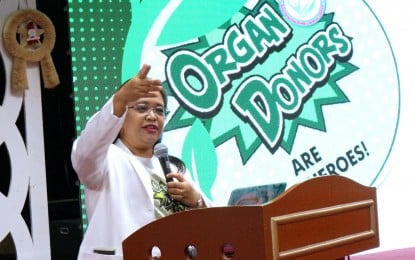Deceased organ donation needs more info drive – nephrologist

ORGAN DONATION. Dr. Ma. Theresa Bad-ang, nephrologist and head of Southern Philippines Medical Center-Human Advocate and Retrieval Effort, stresses the need for the public to be aware of the importance of deceased organ donation, at the Southern Philippines Medical Center in Davao City. As of the 2022 Department of Health data, 90,000 Filipinos are on dialysis, with around 2,400 of them in the Davao Region. (PNA photo by ROBINSON NIÑAL Jr.)
DAVAO CITY, Philippines — Family consent remains the top problem in deceased organ donation, a doctor at Southern Philippines Medical Center-Human Advocate and Retrieval Effort (SPMC-SHARE) in Davao City bared.
In an interview with the Philippine News Agency on Friday, Dr. Ma. Theresa Bad-ang, nephrologist and head of SPMC-SHARE, said the public needs to be aware of the importance of deceased organ donation.
She said the refusal of family members to allow patients with irreversible loss of brain function to donate their organs remains a setback.
“That’s why we need them to understand everything about organ donation. We will continue to intensify our efforts in campaigning for the public to be more aware of the importance of organ donation,” she said on the sidelines of Organ Donor’s Week activities.
She said the public must think about saving lives.
Article continues after this advertisement“This is not a call for you to sell your kidney but a call for donation if you don’t need it anymore,” Bad-ang said.
Article continues after this advertisementThose willing can sign up for donor cards, just like when applying for a driver’s license, or process through the National Kidney and Transplant Institute.
Once signed up, the organ donor should inform their families.
As of the 2022 Department of Health data, 90,000 Filipinos are on dialysis.
In Davao Region, there are around 2,400 patients, with an approximate increase of 12 to 15 percent per year.
“Yes, the dialysis is free, but the survival rate is five years. While 80 percent will live after one year, after five years, only 50 percent lives,” Bad-ang said.
However, if a patient has an organ transplant, the survival rate goes to 98 percent.
In 2020, the City Council passed an ordinance to institutionalize organ donation in the city and promote awareness among the Dabawenyos.